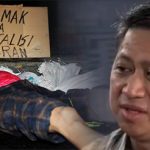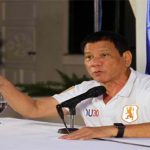President Rodrigo Duterte believed that there is no more “Marcos trauma” among the Filipinos, judging from the results of the May 9 elections that showed “minimal” difference between the votes for Vice President Leni Robredo and former Senator Ferdinand “Bongbong” Marcos Jr.
Speaking to the media at the Magsaysay Park in Davao City on August 24, Duterte was once again peppered with questions about his decision to allow the burial of the late dictator Ferdinand Marcos Sr. at the Libingan ng mga Bayani despite allegations of human rights violations and massive corruption.
“Tingnan mo pagtakbo ni Bongbong. Iilan diperensya lang sila? It’s about 200,000. Tapos sabihin ninyo na it’s still fresh?” Duterte said.
“Even Bongbong Marcos was… Sabi niya, dinaya siya. Baka… Kung hindi siya dinaya, talagang manalo siya,” he added.
Duterte also pointed out that Robredo’s “minimal” lead over Marcos could be an indication that the Filipinos may have forgotten or are no longer concerned about what the former dictator did during martial law.
“Well, even then I said the number is a very minimal – if it’s indication to you that there is no more such thing as a Marcos trauma just look at the results of the election. It will tell you that… Si Leni is naghabol sila…” he told reporters.
In the last elections, Robredo won over Marcos by only 200,000 votes and the latter filed an election protest. His protest, however, was marred with controversies with one witness denying issuing an affidavit and Robredo’s camp pointing out identical affidavits of witnesses from different provinces.
Duterte said he did not care whether the former president Marcos was a hero or not.
[ads1]
“They are contesting kung hero ba si Marcos. Wala akong pakialam. Whether hero siya o hindi, pagka sundalo siya, diyan siya. Yung hero hero, pulitika na yan eh,” he said.
“Ngayon, sabi hindi siya hero. Who are we to say that? Wala naman tayong panahon sa giyera eh. Who are we to dispute? Sa mga taong, opisyal nagbigay sa kanya ng medalya. So why are you insisting na hindi siya hero [na] totoo?” he added.
The US Army has concluded that Marcos’ war claims were “fraudulent” and “absurd” and questioned some of his medals. Even then, Duterte remained unmoved by Marcos’ fake medals as he said, “He did not receive the medal? Correct. Well, that is the record of another country. Why would I [rely] in making a decision [referring] to the records of another country?”
Duterte reiterated what has always been his stand when it comes to Marcos’ burial at the heroes’ cemetery – that Marcos was a soldier and a former president, regardless of whether he was a good one or not.
“Bakit pa ako mag-dilly-dally, ibang president ayaw? Hero, hero. Hindi hero? Eh, di hindi. Sundalo, oo. Kung magaling siya na presidente, it depends. Almost half of the country says that he was a good president,” he said.
“Lalo na mga Ilokano. O ‘di nasasaktan sila nitong ginagawa ngayon. So hindi nahi-heal yung… Lahat ng Ilocano, sikreto lang, may galit ‘yan,” he added.
But some Ilocanos launched an online petition via change.org to “Keep Marcos in Ilocos” to be buried beside his mother, as per his dying wish, and to continue boosting the tourism and the local economy in the region as Marcos’ tomb have drawn tourists in.
The Ilocano petitioners also reminded Duterte about the fight of his own mother, Nanay Soling, against martial law.
Addressing this, Duterte told the reporters in Magsaysay Park that the Ilocanos are hurting because of the movement against Marcos.
“All the Ilocanos, who are also Filipinos, are hurting because of what the Yellows have done, including my mother,” Duterte said, referring to the Yellow Friday Movement, which his mother led in Davao, to oust Marcos and install the late President Corazon Aquino in power.
“My mother is already dead, so, everything is gone, including the politics of martial law,” the Inquirer quoted Duterte.
But other martial law victims would disagree, as they filed a petition to the Supreme Court, which issued a status quo ante order (SQAO), stopping Marcos’ burial from August 23 to September 11, while the Court holds oral arguments starting August 31.
Sources: (gmanetwork.com, newsinfo.inquirer.net, news.abs-cbn.com)
[ads3]


